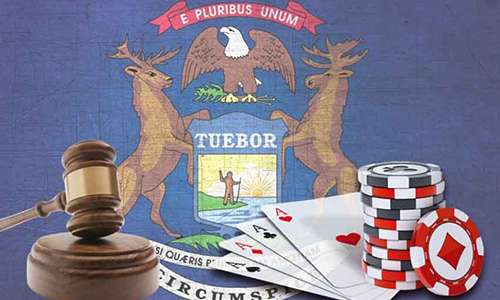Michigan Online Gambling Bill Off to Strong Start
In December of last year, outgoing Michigan Governor Rick Snyder vetoed a set of three bills that would have legalized online poker in the state. While we don’t know exactly how things will go this year, the bills were reintroduced this month and according to a report by OPR, it appears that things are off to a good start.
 Rep. Brandt Iden is the man spearheading the online gambling initiative and is the primary sponsor of the current bill, HB 4311, in the Michigan House.
Rep. Brandt Iden is the man spearheading the online gambling initiative and is the primary sponsor of the current bill, HB 4311, in the Michigan House.
When Snyder vetoed Iden’s baby last year, Iden expressed his feelings to SportsHandle, saying, “The governor just vetoed bills. I am surprised and disappointed. With this many stakeholders on board, it took us two years to get to this point, and it’s the first time in any state history that we had all the parties that were supportive of the bill (in agreement).”
And there was a lot of agreement. The bill passed a House vote 71-35 and its companion bill passed even more smoothly in the Senate, 33-5. The three Detroit casinos, MGM Grand Detroit, Greektown, and MotorCity, were all on board as well, after coming to a compromise with the state’s Native American tribes.
Governor Snyder cited concerns about cannibalizing the state lottery and the expansion of gambling into people’s homes in his veto letter:
A significant amount of work went into these bills and getting them to a place where several stakeholders either expressed support or neutrality, and I appreciate that many pro-gaming stakeholders coalesced around these bills. However, due to largely unknown budgetary concerns, I believe this legislation merits more careful study and comparison with how other states have, or will, authorize online gaming. To be blunt, we simply don’t have the data to support this change at this time.
Principally, gambling behavior could shift from the State’s ILottery program to internet-based gambling at casinos. In Fiscal Year 2017, the lottery distributed $924.1 million to the School Aid Fund. For each $10 of spending on the lottery, the School Aid Fund receives approximately $2.76. Under HB 4926, because of its lower tax rate, each $10 in online betting translates into just four cents deposited into the School Aid Fund. Such a significant reduction, without a clearer understanding of internet gambling revenue growth potential, is concerning. Moreover, I am also concerned that revenues may be lost as gambling behavior shifts from on-premises, to online.
Finally, I am concerned that the bills will encourage gambling by making it much easier to do so. I do not think it is appropriate to sign legislation that will effectively result in more gambling, with a reasonable chance that the state could lose revenue that could be helpful in dealing with social service issues that are ordinarily attendant to increased gambling behavior.
First Hearing Was Productive
To that last concern of Snyder’s, OPR’s Steve Ruddock wrote that Nick Means of The Stars Group testified in front of the House Regulatory Reform Committee that legalizing and regulating online gambling won’t put a casino in every child’s pocket. That is already available, he said, but with zero oversight. Regulation will put up barriers to kids having access to internet gambling, something that prohibition can’t do as effectively.
John Pappas, the former head of the Poker Players Alliance who spoke on behalf of GeoComply, demonstrated a real-time map of online gambling activity in New Jersey to show committee members that geolocation technology not only can work, but does work right now.
Even with Snyder’s veto in 2018, Rep. Iden was optimistic that something could get done this year, even if that optimism was cautious. His biggest concerns were new Governor Gretchen Whitmer and a batch of new House and Senate members. He did not know what Whitmer’s feelings on internet gambling would be, and though the legislature passed the bills overwhelmingly, new lawmakers would need to be educated on the matters.
So far, so good, it sounds like. OPR reported that the tone of Tuesday’s hearing was quite positive and perhaps most surprisingly, the committee members who asked questions actually asked good ones. It appears that Iden may feel a lot better about his prior concerns of needing to educate his colleagues about online gambling. We usually see questions in these sorts of hearings coming from positions of complete ignorance, but not so this time, according to OPR.
And since the online gambling bills already passed both chambers easily last year, Iden knew, even though he did have concerns, that he already had a head start this year. It looks like it will eventually be up to the governor again to decide the future of online gambling in the state of Michigan.



















COMMENTS